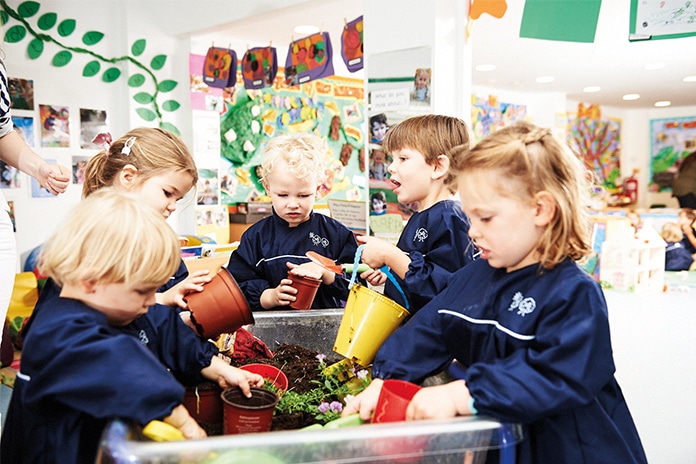Starting school can be emotional for children and parents. Here Mama asks an expert how to best prepare your little one - and yourself - for the big day.
Words: Holly Kirkwood
Each new life stage for children is inevitably a teary day for their parents, and the first day of school has to be up there as one of the most emotional. Waving them off as they start their own journey, it’s a big deal for everyone. But once you know where your child is starting school, the run up begins and many parents feel concerned that they’re not doing enough to prepare their kids for that seminal first day.
We talked to education expert, and head of The Kindergardens nursery group, Carol Evelegh, to find out what parents can do to make the transition as easy as possible.
“The first thing I’d say is that a happy child has the most chance of being a successful child, ” she points out.
Carol’s philosophy is that if a child starts school feeling confident and not worried about failing, or putting their hand up to ask a question, that is the best preparation they can have.
“London can be a terrible hothouse and the best thing that parents can do is to relax: make sure your child knows from an early age that having a go at something is what it’s all about,” says Carol. “What you want to do as a parent is encourage their natural curiosity; this enthusiasm for learning is far more valuable than the ability to excel at sports or exams.”
Carol is also keen to stress that you won’t be able to control all their choices, or what they are good at. You might want your child to shine at clarinet, or coding, but if they’re not keen you won’t be able to force it.
“Give them the space to explore and develop themselves.” Another crucial thing to remember is not to compare your child to other children, however difficult it is to make yourself stop,” she explains.

What should they be able to do?
In terms of literacy and numeracy there will be an enormous disparity in where four and five year-olds are, but most children will be able to count to 20, recognise their own name written, and perhaps write their own name. However, it’s more important that little ones are independent. They should be able to put on their own coat and shoes and get their schoolbag without assistance.
In addition they should be confident going to the toilet alone, be able to sit still and concentrate for at least ten minutes. Hopefully they will already be doing this as most nurseries will be teaching pre-schoolers these skills anyway.
Making friends is also crucial. “It’s great to start school with a few people you know, but it’s also a real skill to be able to expand your world and add to your friendship groups as you develop new interests and experiences.”
As parents, Carol says you can encourage this by exploring the world around you. She suggests you look at signs, numbers and shops on the street. When you read to them, make it fun and don’t correct them too much. Certainly don’t give young children the answers, let them take the time to try and figure things out for themselves.
Are children young for their year at a disadvantage?
Don’t worry too much about where your child is in the year is Carol’s advice – a mixed bag of ages actually makes for a really good environment for learning: it lets older children who are slower academically feel at ease, while younger children who are bright can also find their own level.
It’s also worth remembering that often the youngest ones turn out to be the toughest, and will apply themselves to excel because of the challenge of keeping up.

How to talk about starting school
You need to present school as the next new adventure. Make sure you take them to visit the school more than once before they start so it’s familiar. And for your part, don’t stand at the door weeping: give them a huge smile and turn around and walk away – even if it’s hard. Positivity is what they need to see.
Once they are in the routine, don’t expect a full download of their day when they get home. Let them come to you if they want to, but don’t give them the ninth degree. They will be exhausted – probably for the whole first term – and will need lots of rest and gentle encouragement from you. You can also expect that after the novelty wears off they’ll go through a phase of not wanting to go: this is completely normal and they will get over it.
Once they are settled in you should feel confident about where they are spending their days. “You’re at the wrong school if you don’t feel you can approach the teachers about any of your concerns,’ Carol points out. “Similarly, the teachers should come straight to you if they feel there is anything you need to know”.
If you do have concerns about anything, you should make an appointment straight away (don’t just show up at the end of the day demanding a meeting). And feel free to talk to the head – Carol stresses that heads are not to be feared; they should be involved.
It is also helpful to build up a relationship between home and school, so if your little one has a success at school, they talk about it at home, and, similarly, if they won a match at the weekend or had a special day out, make sure the teachers know, and can talk about it. There must be continuity between the two worlds.
But also try to relax. This is a well trodden path and should be a positive experience for both children and parents.






NO COMMENT